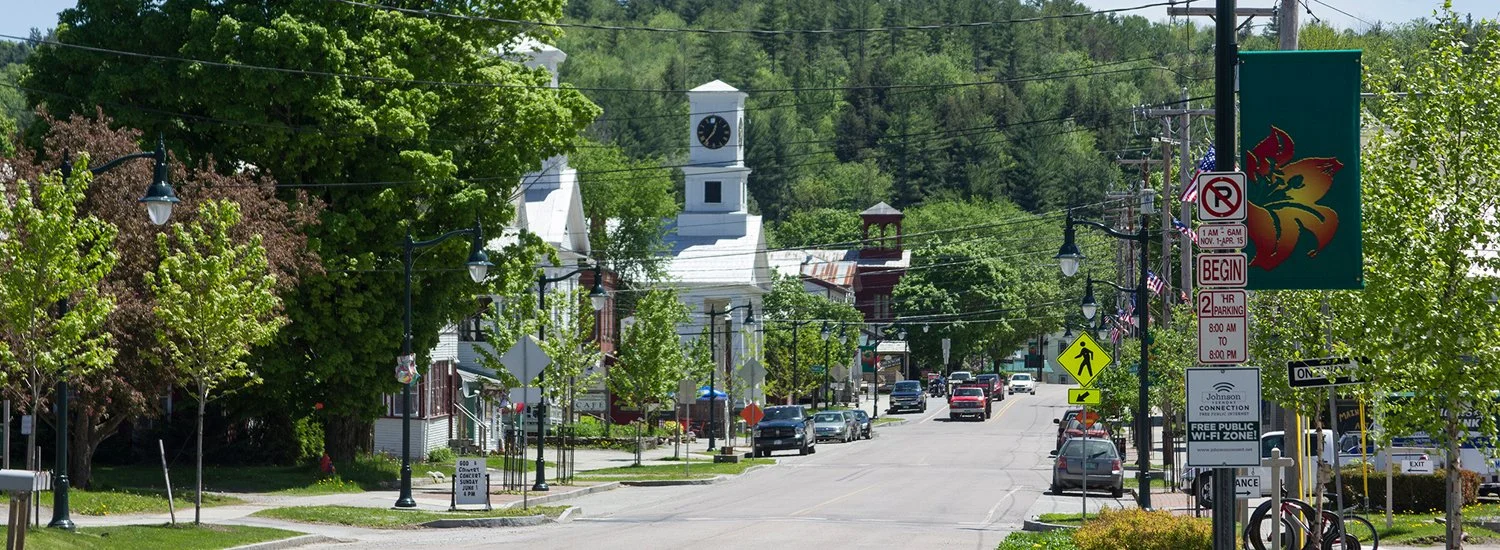
Vector in Vermont
“Kites and Darts-7” ( mokuhanga collage, sumi and silver on handmade paper), by Underhill, Vt.-based artist Patty Hudak, in the group show “Dynamism’’, at Vermont Studio Center, in Johnson, through Jan. 25.
— Image courtesy of the artist.
The show features work by 10 artists who work in traditional forms and those who work in new media. Each artist explores their practice in different ways: from site-specific installations to vibrant abstract landscapes to digital imagery. All artists involved in this show are local to Vermont Studio Center and have studios on site.
Downtown Johnson in the college town’s brief but bucolic summer.
View of Underhill, Vt., and the famous ski mountain Mt. Mansfield, at 4,393 feet the state’s highest peak.
'Lonely, happy child'
Newly emerged adult cicada
— Photo by Ollllonate
“Parents open their shutters and call
the lonely, happy child home.
The child who hates silences talks and talks
of cicadas and the manes of horses.’’
— From “All Summer Long,’’ by Carol Frost (born 1948) in Lowell, Mass. She has taught at the Vermont Studio Center, in Johnson, Vt.
From Marxism to the Burlington marketplace
Church Street Marketplace in Burlington
“‘People’s Republic
of Burlington,’ old Marxist
stronghold, now just a stage
on its way to high
capitalism. Church
Street commodified.
Out on the loop roads
of Montpelier, what does ‘strip
development’ strip? Grass
from pastures….”
— From “Hayden’s Shack I Can See to the End of Vermont,’’ by Neil Shepard (born 1951), a Johnson, Vt.-based poet
'Fear has softened'
”So often, so long I have thought of death
That the fear has softened. It has worn away.
Strange. Here in autumn again, late October,
I am late too, my woodshed still half empty,
And hurriedly I split these blocks in the rain,
Maple and beech….”
— From “Song: So Often , So Long Have I Thought,’’ by Hayden Carruth (1921-2008), native of Connecticut and long-time resident of Johnson, Vt.
Fog in the Lamoille River valley in Hyde Park, Vt., near Johnson
'Insane song'
Loon in Marshfield, Vt.
— Photo by Ano Lobb
,
“Summer wilderness, a blue light
twinkling in trees and water, but even
wilderness is deprived now. ‘What's that?
What is that sound? ‘ Then it came to me,
this insane song, wavering music….’’
— From “The Loon on Forrester’s Pond,’’ by Hayden Carruth (1921-2008), celebrated American poet who lived for years in Johnson, Vt.
Daniel Regan: Reading for the sake of reading
At Northern Vermont University — Johnson, where the author served as dean of academic affairs.
From The New England Journal of Higher Education, a service of The New England Board of Higher Education (nebhe.org)
JOHNSON, VT.
Typical lists of core competencies for undergraduates feature written communication, critical thinking and information literacy, among others, but merely presume, leaving unstated, the bedrock importance of reading skills. Lifelong learning, a dedication to which is part of practically all mission or aspirational statements, includes the ongoing practice and continued appreciation of those core skills, including—presumably—reading.
What is rarely discussed, however, is why we continue to read. Yet to that seemingly simple question there can be several answers, which may differ for our varied student bodies: traditional-age students, say, compared to the adult learners that colleges and universities seek increasingly to attract. The answers may also change for individuals as they advance through the life cycle. These changes deserve greater awareness and more explicit attention. Specifically, why bother to read when you’re old?
I have always loved to read. But why? The answers are much different now than they were before. And what I get from my reading has changed, too. I have long considered reading the bottomless well to which I could turn as needed, a singularly empowering resource in my life. If I found myself in a pinch, I figured I could read my way out of it, by learning what I needed to know. Now though, if I am honest with myself, increasing my stock of deployable information and skills is not really why I read, even if one does amass a good bit of knowledge, some of it usable, along the way.
For the most part, however, I don’t read to learn, especially when it comes to reading more extended pieces. The exceptions, while significant, are either mundane (most recently, for instance, how to clean my coffeemaker) or quotidien (regular information and perspectives from newspapers and magazines). For more in-depth reading, staying au courant is clearly not my goal—since so much of what I read is not particularly current.
Nor do I read for purposes of explicit self-improvement, about which I generally care very little at this point in my life. Again, there are exceptions: for instance, of late, Ibram X. Kendi’s works on antiracism. But I’m not reading great novels or major works of non-fiction as a means of working through problems or applying insights gained to my own life. In fact, I am not really using what I read for any particular purpose—surely not to identify a salient reference or mark a potential quotation for a research paper.
It is also not to acquire bits and pieces of knowledge, Jeopardy-style, that I read. There’s scarcely room in my memory registers for that. In truth I can barely, without a jog, conjure up what I’ve read a relatively short time ago. The recent experience of reading Joyce Carol Oates’s and Christopher R. Beha’s (eds.) Anthology of Contemporary American Short Fiction, for instance, with its 48 selections over 760 pages, was brilliant but dizzying. I would stumble, if asked just days later, to pinpoint which stories I found most striking.
But luckily, instant recall doesn’t matter so much, because I’m no longer aiming to impart what I’ve read to others. I taught for a long time, and loved it, but do so no longer, except for some weekly tutoring at an adult basic-education center. Thus I am no longer an interpreter of or mediator between the works of a primary author and an audience of students or colleagues. Now what I read stays mostly inside, in intense but internal dialogue, except for occasional comments to college-age kids or my spouse. And I surely do not read just to pass the time. There are far easier ways of doing that.
So, why read (or re-read) Middlemarch? The Last Tsar? The Awakening? Simply Einstein?
The real reason I read, and derive so much pleasure from reading, is because of its intense present-ness. Reading provides an absorption in the moment that, for me, few other activities can match. This form of radical present-ness, an immersion in a different setting, group of people, sometimes another culture or society, is not a form of escape. I never forget who and where I am or my separation from what transpires on the pages I am reading or scrolling through. But the act of reading nevertheless lifts me, and elevates ordinary existence. .
That is why I, now into my 70s, continue reading. With luck I hope to continue well beyond. It won’t be because the works appear on some bucket list composed of the works on the Harvard Five-Foot Shelf or a list of 100 Best Novels, or even the collected works of a particular author. It is freeing to read without a central utilitarian purpose, however valid it might be. Until recently I don’t think I recognized sufficiently the possibility of—well—just reading.
Here are three suggestions by way of conclusion. First, I would encourage the explicit inclusion of reading as a core learning outcome, rather than merely as the assumed foundation for other competencies such as critical thinking, information literacy and written communication. Second, encourage students to consider the varied purposes for which they might read, and how these might change over time. For colleges and universities to truly commit to the lifelong development of our students, consideration ought to be paid to the changing import and meaning of intellectual activities, including reading. And finally, help students see that the pleasure of radical absorption awaits them—at any age.
Daniel Regan is a sociologist and the retired dean of academic affairs at Johnson State College, now Northern Vermont University-Johnson.









